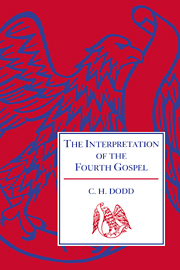Book contents
- Frontmatter
- Contents
- PART I THE BACKGROUND
- PART II LEADING IDEAS
- 1 Symbolism
- 2 Eternal life
- 3 Knowledge of God
- 4 Truth
- 5 Faith
- 6 Union with God
- 7 Light, Glory, Judgment
- 8 Spirit
- 9 Messiah
- 10 Son of Man
- 11 Son of God
- 12 Logos
- PART III ARGUMENT AND STRUCTURE
- APPENDIX: Some considerations upon the historical aspect of the Fourth Gospel
- Index Locorum
- Index Nominum
11 - Son of God
from PART II - LEADING IDEAS
Published online by Cambridge University Press: 10 December 2009
- Frontmatter
- Contents
- PART I THE BACKGROUND
- PART II LEADING IDEAS
- 1 Symbolism
- 2 Eternal life
- 3 Knowledge of God
- 4 Truth
- 5 Faith
- 6 Union with God
- 7 Light, Glory, Judgment
- 8 Spirit
- 9 Messiah
- 10 Son of Man
- 11 Son of God
- 12 Logos
- PART III ARGUMENT AND STRUCTURE
- APPENDIX: Some considerations upon the historical aspect of the Fourth Gospel
- Index Locorum
- Index Nominum
Summary
The idea of a being affiliated to a deity, in one sense or another, was extremely widespread in the ancient world. In Greek mythology there were family relationships among the gods, and as the tendency towards monotheism increased, these mythical relationships afforded the opportunity for expressing the subordination of lesser deities to the one supreme God. Thus Hermes and Apollo were sons of Zeus, and philosophical apologists for religion could interpret this as meaning that such deities of popular worship were manifestations or emanations of the one God. Again, there were demigods and heroes sprung from the unions of gods with mortals, and royal clans like the Heraclidae traced their descent from such beings.
In Egypt, and among various oriental peoples, the reigning king was divine, and was described as the son of the god worshipped as the special patron of the royal house, whether this was understood to mean that his descent could be traced to the god, or that his actual birth was miraculous, or that he was in some sense an ‘epiphany’ of the god himself. In the Hellenistic period the Greek settlers and conquerors readily accepted such ideas, bringing them into connection with their inherited mythology of demigods and heroes, as well as with the practice, which had never been entirely obsolete, of raising men of exceptional distinction (like, e.g., Brasidas the Lacedaemonian and Demetrius Poliorcetes) to the rank of heroes. Alexander was hailed by Ammon as his son, and was later provided with a miraculous birth. After him the Hellenistic sovereigns of Egypt and Syria inherited the divine status of their native predecessors.
- Type
- Chapter
- Information
- The Interpretation of the Fourth Gospel , pp. 250 - 262Publisher: Cambridge University PressPrint publication year: 1953

